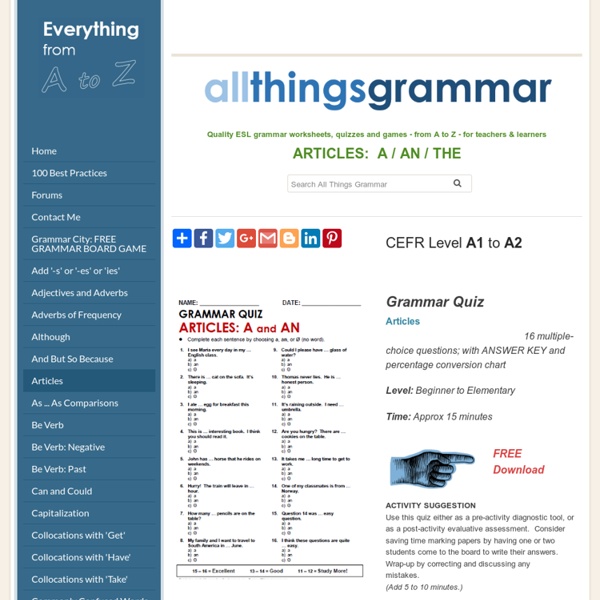



EFL Interactive Grammar Quizzes Printable & PPT Games - Click Here! If you are the type of person who prefers to have games on powerpoint or as printable handouts, we have been thinking of you. We offer board games, powerpoint games and more for the classroom and one to one teaching. They have made my lessons fun and I have no doubt yours will be fun too. Added to the good news are the templates we offer that you can use to create customized games for your classroom and teaching. It is total fun and highly engaging fun lessons with these resources. Read the full story Classroom Tools - Click Here! Get some cool tools for use in your classroom.
Free spelling worksheet maker, printable reading worksheet templates, with images Tools for Educators offers to use as resources for lessons, lesson plans and printable materials for classes Choose the correct word or correct spelling worksheets: Choose a picture and write in three options for the spelling or three words with one correct option. Or here are two makers with all of the vocabulary words available: The spelling worksheet maker allows you to create spelling worksheets to print or small reading quizzes on any theme with pictures . single words, jumbled words, misspelled words , and have the students circle the correct spelling. These can handle some foreign languages as well. preschool, kindergarten and other elementary school teachers to use as young learner resources More reading and spelling worksheet makers: Once your game board has been generated, go into the 'file' menu at the top left of the browser and choose print. These should print fine if you are printing on A4 paper or Letter.
1, 2, 3, GMAT—count nouns on Sentence Correction. | Kaplan Test Prep Consider the following two statements: “I ate some cake at the birthday party” “I ate some cakes at the birthday party” If one of those two sentences sounds fishy, you have a good ear—but I assure you both sentences are grammatically correct. The key concept behind those sentences is the grammatical notion of countability, a set of idiomatic rules frequently tested in GMAT sentence correction problems. If you’ve done many Sentence Correction problems, you’ve probably seen the most common version of this error: the words “many,” “number,” and “few” apply only to count nouns such as “dollar” and “catamaran,” while uncountable things like “money” and “sand” must be described with “much,” “amount,” and “little.” And finally, some words—like cake, in our opening example—have different meanings depending on whether they are treated as a plural noun or as an uncountable one. Problem: (A) at less than 68,000 people and fewer (B) at fewer than 68,000 people and fewer Solution:
Adele's ESL Corner - Your free online English language website How can film help you teach or learn English? | British Council What can film and video add to the learning experience? Kieran Donaghy, who won the British Council’s TeachingEnglish blog award tells us why film is such a good resource and recommends some useful websites, in one of our top five articles of all time, illustrated by artist Jamie Johnson. Language teachers have been using films in their classes for decades, and there are a number of reasons why film is an excellent teaching and learning tool. Learning from films is motivating and enjoyable Motivation is one of the most important factors in determining successful second-language acquisition. Film provides authentic and varied language Another benefit of using film is that it provides a source of authentic and varied language. Film gives a visual context The visuality of film makes it an invaluable language teaching tool, enabling learners to understand more by interpreting the language in a full visual context. Variety and flexibility Lesson plans Allat C Lessonstream Viral ELT Film English
Mass noun In linguistics, a mass noun, uncountable noun, or non-count noun is a noun with the syntactic property that any quantity of it is treated as an undifferentiated unit, rather than as something with discrete subsets. Non-count nouns are distinguished from count nouns. Some mass nouns can be used in English in the plural to mean "more than one instance (or example) of a certain sort of entity"—for example, "Many cleaning agents today are technically not soaps, but detergents." In such cases they no longer play the role of mass nouns, but (syntactically) they are treated as count nouns. Some nouns have both a mass sense and a count sense (for example, paper). Relating grammatical number to physical discreteness In English (and in many other languages), there is a tendency for nouns referring to liquids (water, juice), powders (sugar, sand), or substances (metal, wood) to be used in mass syntax, and for nouns referring to objects or people to be count nouns. Cumulativity and mass nouns
English Grammar Online - free exercises, explanations, vocabulary, dictionary and teaching materials British Vs American English: 100+ Differences Illustrated Given the amount of places around the world that English is spoken, various differences are bound to emerge. Despite how much the USA and UK have in common, there are enough differences between their two versions of the English language that someone may not always understand exactly what someone from the other country is saying. Fortunately, the US State Department has created a series of useful graphics to help clear things up. Show Full Text The US and the UK's imperial histories and modern influence over the world have changed the English language forever. Because it was exported to countries all over the world, it has been forced to accept different Even if you're a native speaker of UK or US English, there's a good chance you'll learn something new here. More info: americanenglish.state.gov (h/t: designyoutrust, demilked)